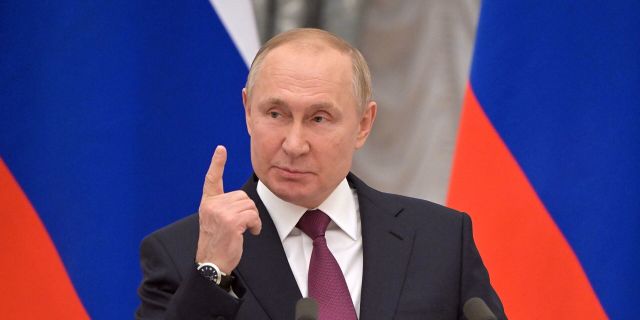"A very powerful weapon." How Putin threatens NATO with a "retaliatory strike"
Putin will not start military operations against the West and NATO, retired British General Simon Mayall is sure. He noted that the Russians have "gas weapons" in their hands, which caused alarm throughout Europe.
A retired army officer says that Vladimir Putin will not dare to take military action as part of a confrontation with NATO and the West.
Retired British Army officer Sir Simon Mayall told how Russian President Vladimir Putin intends to respond to Western economic sanctions.He believes that an energy war will begin, and gas supplies will become the weapon. Putin has already fired the first salvo, reducing the pumping of gas to the EU via the Nord Stream —1 to 20% of its capacity.
In an interview with the Times Radio station, Mayall stated: "The Russians are clearly using "gas weapons" with the aim of destroying NATO and weakening Western solidarity."
"Using energy resources that we need in all spheres of life is essentially a very smart move, and a very, very powerful weapon in the hands of the Russians, who use it as a means of retaliation, because at the moment they are not going to fight with us."
Another blow to the EU was the decision of the Russian state—owned energy giant Gazprom to reduce the pumping of gas through the Nord Stream -1 pipeline from 40 to 20% of its capacity. Usually this pipeline is used at full capacity, but with the beginning of the military conflict, Gazprom reduced the pumping of gas to 40% of its capacity, and now it has reduced it even more. This caused alarm throughout Europe.
EU energy ministers have signed an agreement on an emasculated emergency gas plan. Last week, European Commission President Ursula von der Leyen called on all European countries to reduce gas consumption by 15% from August to March.
But this proposal ran into resistance from southern European countries, such as Italy and Spain, who objected to the developed plan. Portugal, which is the "cleanest" country in Europe, since it receives 60% of its electricity from renewable sources, called the proposal unacceptable, saying that it consumes exactly as much electricity as it "absolutely needs."
Weakened by reservations and exceptions, the plan provides for a voluntary reduction of gas consumption by 15%.But it may become mandatory if the volume of gas supplies lags behind demand, taking into account exceptions.
Warning of possible damage from the proposed proposal, Mayall said: "This will have a direct impact on voters, citizens and those people who observe the consequences of Russian actions and, of course, Western sanctions against Moscow imposed as a result of such actions. And one can imagine that some will begin to doubt our desire to cooperate with Ukrainians and support them, given that there are problems with grain supplies."
Mayall believes that by fighting on the energy and food front, Vladimir Putin wants to force the EU to lift economic sanctions.
German Economy Minister Robert Habeck rebuffed Putin's attempts to sow discord in the European Union, saying: "You won't quarrel with us."
However, Spain and Portugal, which are poorly connected to the EU gas pipeline network, express concerns about mandatory reduction of gas consumption.
Greece also said that such a plan would be too heavy a burden on its economy and population.
Hungarian Foreign Minister Peter Szijjarto, whose country still imports 80% of the gas consumed from Russia, questioned the "legal validity" of such a proposal, which would "determine how much gas each member country can consume, and from which supplier."
"Will someone in Brussels explain to Hungarians why they and their companies cannot use gas, even though there is gas in Hungary?" The minister asked.
Author: Thibault Spirlet (Thibault Spirlet)

